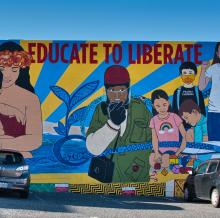
Edited by Nyashadzashe Mandivenga and Sara Camacho Felix, this e-book brings together voices from authors of diverse backgrounds, offering a wealth of rich and actionable ideas on the connections between decolonial education and youth aspirations.
In an era where young people are increasingly recognised as pivotal actors in shaping their own futures through their activism and social engagement, the role of education becomes critical as it can enable, ignore, or stand against this rising engagement. This e-book explores how decolonial thought, practice, and pedagogy can liberate youth imaginations from the constraints of capitalist coloniality. It does so by positioning schooling as a practice through which new social possibilities and futures can be imagined. The chapters provide in depth analyses of coloniality’s role in limiting imagination and highlight how education systems reinforce Eurocentric knowledge systems and hierarchies. They also provide dynamic and inclusive perspectives on how youth aspirations can inspire alternative futures built on solidarity, mutual aid, and diverse knowledge systems. Moreover, this e-book offers insights into how institutions can reshape their structures and pedagogies to support collective imagination and radically different aspirations, moving beyond neoliberal constraints and fostering truly transformative education. Acknowledging students as” future-makers” (Spyrou, 2020) positions learning at the heart of a decolonial approach to reach the possibility of non-Eurocentric systems of education and therefore aspirations (Abebe, 2021). Inspired by rights in education debates, the e-book explores the intersection of future-oriented education (Prensky, 2014) and decolonial teaching practices, seeing the classroom as a site where ideas about the future are negotiated and developed. Education should not only prepare students for the world as it is but also empower them to imagine and create the world as it could be.
By exploring these interconnected themes, the e-book offers answers to a number of important questions such as: how does education shape/manipulate student aspirations and understandings of their role in society? How have students across education levels been increasingly asserting themselves as change-makers who play a crucial role in shaping the future? What does decolonial education look like?
Image: Ted McGrath CC BY-NC-SA 2.0




